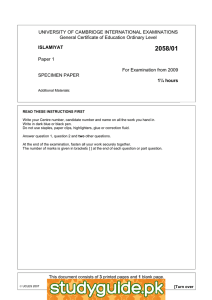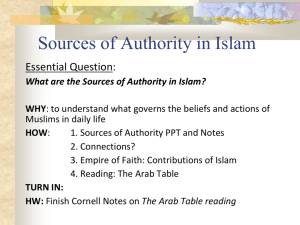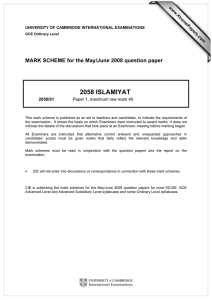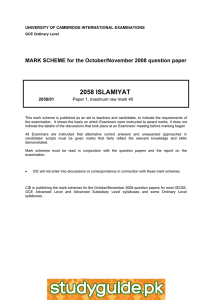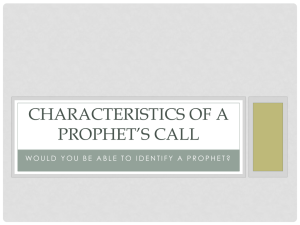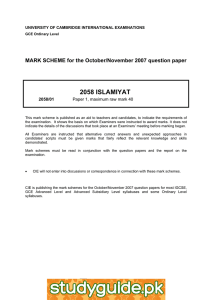2058 ISLAMIYAT MARK SCHEME for the May/June 2014 series
advertisement
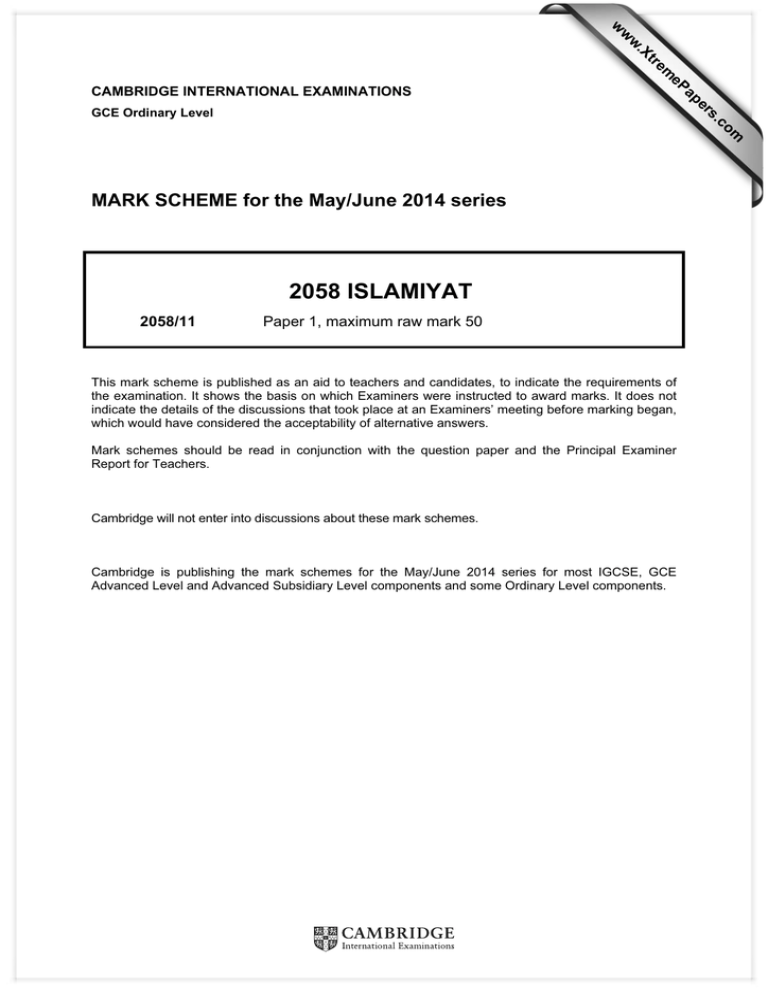
w w ap eP m e tr .X w CAMBRIDGE INTERNATIONAL EXAMINATIONS s er om .c GCE Ordinary Level MARK SCHEME for the May/June 2014 series 2058 ISLAMIYAT 2058/11 Paper 1, maximum raw mark 50 This mark scheme is published as an aid to teachers and candidates, to indicate the requirements of the examination. It shows the basis on which Examiners were instructed to award marks. It does not indicate the details of the discussions that took place at an Examiners’ meeting before marking began, which would have considered the acceptability of alternative answers. Mark schemes should be read in conjunction with the question paper and the Principal Examiner Report for Teachers. Cambridge will not enter into discussions about these mark schemes. Cambridge is publishing the mark schemes for the May/June 2014 series for most IGCSE, GCE Advanced Level and Advanced Subsidiary Level components and some Ordinary Level components. Page 2 Mark Scheme GCE O LEVEL – May/June 2014 Syllabus 2058 Paper 11 Candidates must attempt Question 1, Question 2 and two other Questions. 1 Choose any two of the following passages from the Qur’an, and (a) briefly describe the main theme(s) in each passage; [4] (b) briefly explain the importance of these themes in a Muslim’s life today. [4] In order to give a mark for AO1 you will have to read both part (a) answers, and similarly in order to give a mark for AO2 you will have to read both part (b) answers. You should give only two marks, one for both part (a) answers, and one for both part (b) answers. When marking this question, you may have to read the answers a number of times. (1) Sura 6:101–103 101. To Him is due the primal origin of the heavens and the earth: how can He have a son when He has no consort? 102. He created all things, and He has full knowledge of all things. That is Allah, your Lord! there is no god but He, the Creator of all things: then worship Him: and He has the power to dispose of all affairs. 103. No vision can grasp Him, but His grasp is over all vision: He is above all comprehension, yet is acquainted with all things. (2) Sura 2:30–37 30. Behold, your Lord said to the angels: ‘I will create a vicegerent on earth.’ They said: ‘Will You place there one who will make mischief there and shed blood?- whilst we celebrate your praises and glorify your holy (name)?’ He said: ‘I know what you do not know.’ 31. And He taught Adam the nature of all things; then He placed them before the angels, and said: ‘Tell me the names of these if you are right.’ 32. They said: ‘Glory to You, of knowledge we have none, save what You have taught us: In truth it is You who are perfect in knowledge and wisdom.’ 33. He said: ‘Adam! Tell them their names.’ When he had told them, Allah said: ‘Did I not tell you that I know the secrets of heaven and earth, and I know what you reveal and what you conceal?’ 34. And behold, We said to the angels: ‘Bow down to Adam’. And they bowed down. Not so Iblis: he refused and was haughty: he was of those who reject faith. 35. We said: ‘Adam! You and your wife dwell in the Garden; and eat of the bountiful things in it as You wish. But do not approach this tree, or you will run into harm and transgression.’ 36. Then Satan made them slip from there, and got them out of what they had been in. We said: ‘Go down, with enmity between yourselves. On earth will be your dwelling-place and your means of livelihood, for a time.’ 37. Then Adam learnt from his Lord words of inspiration, and his Lord turned towards him; for He is often-returning, most merciful. (3) Sura 41:37 37. Among His signs are the night and the day, and the sun and the moon. Adore not the sun and the moon, but adore Allah, who created them, if it is Him you wish to serve. © Cambridge International Examinations 2014 Page 3 Mark Scheme GCE O LEVEL – May/June 2014 Syllabus 2058 Paper 11 (a) What are the main teachings? (1) Sura 6.101–103 Good answers to this passage will talk about God’s power and knowledge over all things. He is the only one to control the heavens and the earth and so emphasises the theme of tawhid. Candidates could talk about the importance of God being the only creator, not sharing authority with anyone else. They could also mention God’s knowledge and power. He has knowledge about all His creation, and He has power over all His creation. He is not perceivable and mankind should worship Him. (2) Sura 2.30–37 Good answers for this passage will be able to talk about God as Creator and his relationship to his prophets. Answers may talk about God creating Adam, as well as everything else (angels, etc.), and the high position he granted him. They could also mention that God gives knowledge to who he wants and he gives the special status of prophethood to whom he wishes. Also, even when Satan misled Adam, God did not leave him or allow any obstacle to prevent him from making Adam his representative on earth, in other words God looks after His prophets. (3) Sura 41.37 This passage is about God as creator and his power to create and control everything. Good answers will talk about God creating and controlling things in nature, things that benefit mankind. The passage is also about the existence of God and signs in creation. So it is Him alone that should be obeyed. The above answers are not the only answers that could be presented. Candidates should be allowed to develop/show other relevant themes of the passage. They could also give comparisons with themes of other passages. The highest level should be kept for well written answers offering a variety of themes. (b) The importance of these themes. (1) Sura 6.101–103 These teachings emphasise the importance of tawhid for Muslims. The only relationship God has is with His creation, and candidates could write about how man is asked to worship Him as it says in this passage that only He can fulfil their needs. He also sees and hears all that humankind does, so Muslims should keep this in mind. In a world where there are lots of distractions, this sura could remind Muslims that they should always remember their Creator as He is the ultimate authority over their affairs. (2) Sura 2.30–37 Answers could talk about how Adam was the first prophet of God, who was made his representative on earth. This gives Muslims a sense of their connection to God as Adam is called the father of humankind and everyone is descended from him. They could also mention how God showed Adam’s importance; by making the angels bow to him, and forgiving him when he disobeyed. This should make humankind understand their status, they should seek forgiveness from God and worship Him. © Cambridge International Examinations 2014 Page 4 Mark Scheme GCE O LEVEL – May/June 2014 Syllabus 2058 Paper 11 (3) Sura 41.37 The themes are important in this passage by presenting God’s creation of things in nature, in particular the sun and moon and day and night. Good answers will talk about why humans should worship Him and not His creation, and about how the things He creates have an order and harmony, and so Muslims can find signs of His existence in the world around them which should help them to keep their faith. These are not the only points candidates can mention, and personalising the passages to their own or Muslims’ lives, or giving thoughtful answers with examples, could take them higher up the levels. 2 (a) Give an account of how the Qur’an was first revealed to the Prophet. [10] (b) Was it significant that the Qur’an was revealed to someone who could not read or write? Give reasons for your answer. [4] Part (a) tests AO1, and part (b) tests AO2. (a) Good answers will focus on the revelation in the cave of Hira. Candidates could start by writing about the Prophet’s increasing solitude in the cave; when he was 40 the revelation came to him; the angel Jibril came to him and instructed him to read, iqra, and the Prophet replied he could not; the angel squeezed him and said it again; after a third time the angel recited the first three verses of sura alaq (96); the Prophet came out of the cave and saw the angel on the horizon; he was confused and shaken; he ran home and told his wife who consoled him and took him to see her cousin, who confirmed his Prophethood. Development of these points is required for higher levels. (b) Answers could say that being unable to read or write it would not have been possible for the Prophet to have composed the Qur’an himself; the implication is that not being able to compose the Qur’an himself, it shows that the Qur’an is from God; the Arabs had a strong oral tradition which allowed the Qur’an to be preserved through memory alone; he showed his faith in his companions when he allowed them to write down the verses revealed to him. Whichever reason the candidates choose to write about they should elaborate on it to emphasise the importance or significance of it. © Cambridge International Examinations 2014 Page 5 3 Mark Scheme GCE O LEVEL – May/June 2014 Syllabus 2058 Paper 11 (a) The Prophet Muhammad is said to have been patient and trustworthy. Write about events in his life that illustrate these qualities. [10] (b) Choose one of these qualities and explain why it was important for the Prophet to possess it. [4] (a) Candidates should write about events that show these traits in the Prophet, and they should give a detailed narration of the event rather than list a few occurrences. His patience: This was shown through the persecutions, when he was abused and ridiculed, but he did not give up preaching; he did not react when rubbish was thrown on him; when he was offered bribes by the Quraysh he refused and persevered, even through the boycott; he waited until God guided him to migrate; he was patient when revelations stopped for periods of time; he showed patience when the Quraysh ridiculed him after the death of his son. Trustworthiness: He had always been trusted by the Quraysh even before prophethood, being called al-amin; the Quraysh kept their belongings with him even after prophethood; when he migrated to Madina he returned the belongings to their owners (through ‘Ali); he kept his promises, e.g. as part of the Treaty of Hudaibiya, the Prophet sent back Muslims to Makka who had not sought consent to leave. These are some answers that could be offered but candidates may have others that they can develop. (b) Candidates should choose one of the above qualities and give reasons as to why it was necessary for the Prophet to have that quality. For example, the Prophet needed to be patient because he was going to endure years of hardships and becoming angry or giving up would not have been suited to a Prophet and would not have allowed Islam to endure. Or, being trustworthy at all times allowed people to have faith in him and his message when he started to preach as they knew that his quality of being trustworthy was unshakeable. Candidates could give any relevant example of why the Prophet should have had that quality but the development of the answer is what will give the candidate higher marks. © Cambridge International Examinations 2014 Page 6 4 Mark Scheme GCE O LEVEL – May/June 2014 Syllabus 2058 (a) Describe the roles played by Abu Talib and Hamza in the life of the Prophet. Paper 11 [10] (b) Did the role of Abu Talib help strengthen the early Muslim community? Give reasons for your answer. [4] (a) Both men were uncles of the Prophet, one who accepted Islam and the other did not. Abu Talib: he was the brother of the Prophet’s father, and the leader of the Banu Hashim clan, making a respected leader amongst the Quraysh; the Prophet came into his care after the death of the Prophet’s mother and then grandfather; the Prophet worked for him and went on trade journeys with him; the Prophet chose ‘Ali to adopt and look after when Abu Talib faced financial difficulty; after prophethood, the Quraysh would try to get Abu Talib to stop his nephew from his mission, but he remained in support of him; his support of the Prophet provided him with protection from the Quraysh hostilities; Abu Talib died after the boycott, and the Prophet was greatly saddened by his death. Hamza: he was an uncle and foster-brother of the Prophet; he was a warrior and sportsman and had little interest the issues of Makkah; he hit Abu Jahl when he heard Abu Jahl had assaulted the Prophet; after that he became Muslim; it gave the Muslims a lot of strength and they were able to pray in public; in the battle of Badr he killed leading men of he Quraysh including Hind’s father Utbah; she vowed revenge and hired Washi to kill Hamza which he did at the battle of Uhud; he was given the title “chief of Martyrs”. (b) Candidates can give a yes or a no answer but they have to give reasons. Other reasons can be given but they have to be relevant to the question. They could say yes it did, for example, because he allowed the boycotted Muslims to stay at Shib-i-Abi Talib, which gave them a place to stay in a time of difficulty; that he supported the Prophet at all times, which in turn supported the followers of the Prophet and this would have helped them carry on in their mission; that when the Quraysh offered the Prophet bribes and the Prophet refused, Abu Talib said he would not ask him again, which again helped strengthen the support given to the Prophet and his community. They could say no it did not, for example, because he did not become Muslim – if he had more people may have converted; him remaining non-Muslim gave the Quraysh continued reason to oppress the Muslims. © Cambridge International Examinations 2014 Page 7 5 Mark Scheme GCE O LEVEL – May/June 2014 Syllabus 2058 Paper 11 (a) Write briefly about the tasks carried out by the Scribes of the revelation at the time of the Prophet. [10] (b) Explain the importance of the principles employed by the compilers of the Qur’an at the time of the Caliphs. [4] (a) Candidates are required to write about the way in which the scribes wrote down the Qur’an whilst the Prophet was still alive and so details about the gathering of the Qur’an and collecting it into a book, at the time of the Caliphs, are not relevant here. The Qur’an was written in its entirety during the Prophet’s time even though it was not compiled in one text. There were various scribes who had different roles as companions, who wrote the verses down on a number of materials. They wrote on parchments, bone, dried leaves, amongst other things. Some of them were official scribes who wrote letters for him (for example Ubayy ibn Ka’ab) whilst some became scribes because they kept their own personal copies of the revelations (for example ‘Abdullah ibn ‘Amr ibn al-‘As. He sought the Messenger’s specific permission asking, ‘May I write down everything I hear from you in the states of contentment and anger?’ He replied, ‘Yes, for I speak nothing but the truth.’). A number of companions had their own personal copies of the words of the revelations, which were later used to verify the one copy in the time of Abu Bakr. Companions who kept a private record of the text of the Qur'an satisfied themselves as to the purity of their record by reading it out to the Prophet. The Prophet used to instruct the scribes about the sequence in which a revealed message was to be placed in a particular Sura (chapter). In this manner, the Prophet arranged the text of the Qur’an in a systematic order till the end of the chain of revelations. Zayd ibn Thabit reported, “We used to record the Qur’an from parchments in the presence of the Messenger of God.” Zayd bin Thabit, one of the chief scribes relates: "I used to write down the revelation for the Holy Prophet, may the peace and blessings of Allah be upon him. When the revelation came to him he felt intense heat and drops of perspiration used to roll down his body like pearls. When this state was over I used to fetch a shoulder bone or a piece of something else. He used to go on dictating and I used to write it down. When I finished writing the sheer weight of transcription gave me the feeling that my leg would break and I would not be able to walk anymore. When I finished writing, he would say, 'Read!' and I would read it back to him. If there was an omission or error he used to correct it and then let it be brought before the people." Some companions, who did not write down the revelations, had memorized them instead and their versions were used to verify the written copies after the Prophet’s death. © Cambridge International Examinations 2014 Page 8 Mark Scheme GCE O LEVEL – May/June 2014 Syllabus 2058 Paper 11 (b) After the Prophet’s death there was deemed a need to compile to Qur’an into a book form. Various principles were employed, all of them to ensure authenticity to the original message. The Qur’an was compiled in the dialect of Quraysh because it was the Prophet’s dialect – other dialects could have been fabricated or distorted. Zayd bin Thabit gathered written materials from various companions, and checked all these versions with those who had committed the Qur’an to memory – this was to ensure that none of the written copies had anything added or omitted and so that the Qur’an remained authentic to the way the Prophet had received it. The order of the suras was not complied in the order that the Prophet had received revelation, but generally in order of descending length – this was due to the belief that the order of the suras was divinely ordained and the main scribes would have known this. Candidates can offer other reasons or principles, but they should explain the significance of their answers. © Cambridge International Examinations 2014
